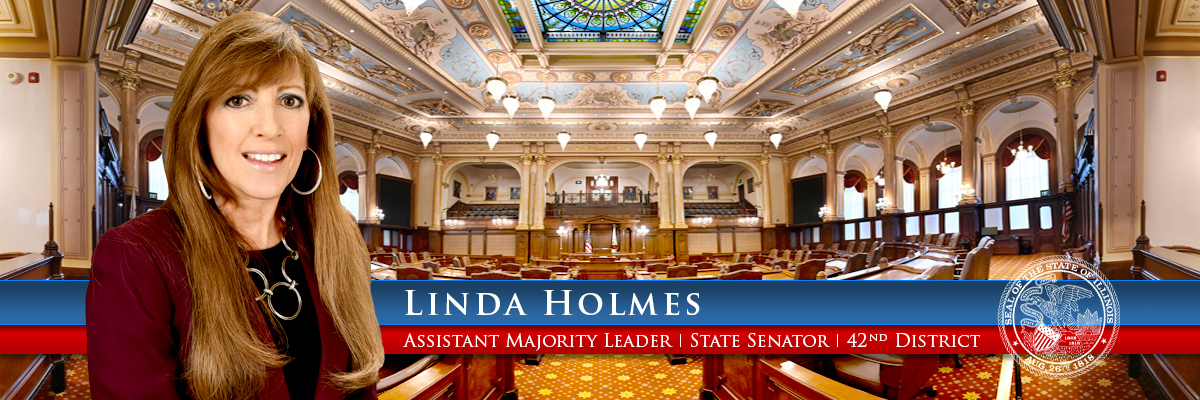Holmes advances inclusive insurance coverage for menopause relief treatment
- Details
- Category: New Releases
 SPRINGFIELD – State Senator Linda Holmes’ effort in the Senate to ensure insurance coverage for treating menopause symptoms without regard to whether the onset was natural or surgical. Holmes’ measure, House Bill 5295, passed the Senate Thursday.
SPRINGFIELD – State Senator Linda Holmes’ effort in the Senate to ensure insurance coverage for treating menopause symptoms without regard to whether the onset was natural or surgical. Holmes’ measure, House Bill 5295, passed the Senate Thursday.
Menopause occurs when an individual’s estrogen and progesterone hormone levels start to fall. If it begins naturally, symptoms show up over time; if it is a result of surgery, those effects start and advance quickly after the procedure.
“In either event or at whatever age, hormonal changes can bring on complications that affect our overall health and well-being. As estrogen drops, bone density can decrease and cardiovascular risks can rise,” said Holmes (D-Aurora). “Menopause therapies are prescribed regardless of the onset reason and must be covered either way.”
Holmes seeks equitable mental health care coverage for healing after miscarriage or stillbirth
- Details
- Category: New Releases
 SPRINGFIELD – State Senator Linda Holmes advanced a measure through the Senate on Thursday that would require insurers to cover care for mental and emotional recovery for individuals who have experienced a miscarriage or stillbirth.
SPRINGFIELD – State Senator Linda Holmes advanced a measure through the Senate on Thursday that would require insurers to cover care for mental and emotional recovery for individuals who have experienced a miscarriage or stillbirth.
“So many who have experienced the loss of a child deal with the trauma for the rest of their lives; pregnancy loss in the case of stillbirth or a miscarriage is often an overpowering shock,” said Holmes (D-Aurora). “This grief can trigger anxiety, stress and depression, and may contribute to substance abuse.”
Holmes advances insurance coverage for menopause relief therapies
- Details
- Category: New Releases
 SPRINGFIELD – State Senator Linda Holmes is leading an effort in the Senate to establish insurance coverage for treating menopause symptoms without regard to whether the onset was natural or surgical. Holmes’ measure, House Bill 5295, passed the Senate Insurance Committee on Tuesday.
SPRINGFIELD – State Senator Linda Holmes is leading an effort in the Senate to establish insurance coverage for treating menopause symptoms without regard to whether the onset was natural or surgical. Holmes’ measure, House Bill 5295, passed the Senate Insurance Committee on Tuesday.
Menopause happens when an individual’s estrogen and progesterone hormone levels begin to fall. If it begins naturally, symptoms arise over time; if it is a result of surgery, those effects start very quickly after the procedure.
“In either event or at whatever age, hormonal changes can bring on complications that affect our overall health and well-being. As estrogen drops, bone density can decrease and cardiovascular risks can rise,” said Holmes (D-Aurora). “Menopause therapies are prescribed regardless of the onset reason and must be covered either way.”
Holmes seeks mental health care coverage for those who have suffered miscarriage or stillbirth
- Details
- Category: New Releases
 SPRINGFIELD – State Senator Linda Holmes advanced a measure through the Senate Insurance Committee on Tuesday that would require insurers to cover treatment for the mental and emotional effects for individuals who have experienced a miscarriage or stillbirth.
SPRINGFIELD – State Senator Linda Holmes advanced a measure through the Senate Insurance Committee on Tuesday that would require insurers to cover treatment for the mental and emotional effects for individuals who have experienced a miscarriage or stillbirth.
“For most expectant parents, pregnancy means happy preparations to welcome a healthy infant to their new family,” said Holmes (D-Aurora). “The shock and grief of an unexpected pregnancy loss can be overwhelming — it may trigger anxiety, stress and depression, and contribute to substance abuse.”
More Articles …
Page 9 of 84




